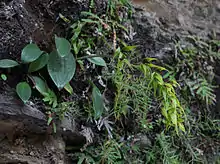Rimacola
Rimacola elliptica, commonly known as the green rock orchid or green beaks,[2] is the only species of plant in the orchid genus Rimacola and is endemic to New South Wales. It is an evergreen species which grows in clumps in sandstone cracks and has bright green leaves and in late spring, produces arching flower stems with up to eighteen dull greenish flowers with reddish or brown markings. It only grows near Sydney, mainly in the Blue Mountains and near Fitzroy Falls.
| Green rock orchid | |
|---|---|
 | |
| Rimacola elliptica near Wentworth Falls | |
| Scientific classification | |
| Kingdom: | Plantae |
| Clade: | Tracheophytes |
| Clade: | Angiosperms |
| Clade: | Monocots |
| Order: | Asparagales |
| Family: | Orchidaceae |
| Subfamily: | Orchidoideae |
| Tribe: | Diurideae |
| Subtribe: | Megastylidinae |
| Genus: | Rimacola Rupp |
| Species: | R. elliptica |
| Binomial name | |
| Rimacola elliptica | |
| Synonyms[1] | |
Description
Rimacola elliptica is an evergreen perennial herb with a short, branched, erect stem but which lacks a tuber. It grows in clumps with crowded, lance-shaped to egg-shaped leaves 40–100 mm (2–4 in) long and 20–30 mm (0.8–1 in) wide on a stalk 10–30 mm (0.4–1 in) long. Between six and eighteen green to yellowish flowers with reddish or brown markings, 18–25 mm (0.7–1 in) long and 16–20 mm (0.6–0.8 in) wide are borne on arching or drooping flowering stems 150–250 mm (6–10 in) long. The dorsal sepal is lance-shaped, 23–27 mm (0.9–1 in) long and 5–6 mm (0.20–0.24 in) wide and the lateral sepals are similar but narrower. The petals are 16–19 mm (0.6–0.7 in) long, about 2 mm (0.08 in) wide and curved. The labellum is egg-shaped, white or green with red markings, 10–12 mm (0.4–0.5 in) long, 7–8 mm (0.28–0.31 in) wide and erect with wavy edges. Flowering occurs in November and December.[2][3][4]
Taxonomy and naming
The green rock orchid was first formally described in 1810 by Robert Brown who gave it the name Lyperanthus ellipticus and published the description in Prodromus Florae Novae Hollandiae et Insulae Van Diemen.[5][6] In 1942 Herman Rupp changed the name to Rimacola elliptica.[7][8] The genus name (Rimacola), given by Rupp, is derived from the Latin word rima meaning "cleft" or "fissure"[9]: 164 and -cola meaning "dweller".[8][9]: 217 The specific epithet (ellipticus) is derived from the Latin word ellipsis meaning "elliptical".[9]: 346
Distribution and habitat
Rimacola elliptica is mainly found in the Blue Mountains by also occurs disjunctly near Fitzroy Falls and near the coast north of Sydney. It mainly grows in sandstone fissures and on damp sandstone cliffs, often with mosses and other small plants.[2][3][4]
See also
References
- Kew World Checklist of Selected Plant Families
- Jones, David L. (2006). A complete guide to native orchids of Australia including the island territories. Frenchs Forest, N.S.W.: New Holland. pp. 284–285. ISBN 1877069124.
- Alec M. Pridgeon; Phillip J. Cribb; Mark W. Chase; Finn N. Rasmussen, eds. (2001). Genera Orchidacearum (Volume 2). Oxford, New York: Oxford University Press. pp. 170–172. ISBN 0198507100.
- Bernhardt, Peter. "Rimacola ellliptica". Royal Botanic Garden Sydney. Retrieved 20 August 2018.
- "Lyperanthus ellipticus". APNI. Retrieved 20 August 2018.
- Brown, Robert (1810). Prodromus Florae Novae Hollandiae et Insulae Van Diemen. London. p. 325. Retrieved 20 August 2018.
- "Rimacola elliptica". APNI. Retrieved 20 August 2018.
- Rupp, Herman (1942). "Robert Brown's Lyperanthus ellipticus". The Victorian Naturalist. 58 (12): 187–188. Retrieved 20 August 2018.
- Brown, Roland Wilbur (1956). The Composition of Scientific Words. Washington, D.C.: Smithsonian Institution Press.
External links
 Media related to Rimacola at Wikimedia Commons
Media related to Rimacola at Wikimedia Commons